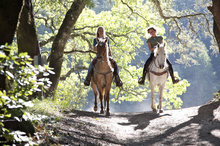Location: VIENNA, Austria
For centuries, horse riding was largely restricted to males in stark contrast to the present day, when nearly 80 percent of riders are women. Modern-day equestrian sports are unique in that men and women compete directly against one another at all levels, from beginners in gymkhanas to national champions in the Olympic Games.

Male or female rider? No difference to horse
Scientists have analyzed how horses are affected by the sex of their riders using parameters of stress and the results were surprising: the level of stress on a horse is independent of whether a man or a woman is in the saddle.
© 2014 by Mark Sellers
"For this reason it is interesting to consider whether a theory of riding that was developed exclusively for men can be applied to women," explains Natascha Ille, the author of the recent publication.
Scientists at the Vetmeduni in Vienna have analyzed how horses are affected by the sex of their riders. Various parameters of stress were determined in horses and their riders when they covered an obstacle course. The results were surprising: the level of stress on a horse is independent of whether a man or a woman is in the saddle.
Furthermore, the stress responses of male and female riders are essentially the same. The results have been published in the Journal of Comparative Exercise Physiology.
A rider is a rider
As Ille notes, "It is often assumed that women are more sensitive towards their horses than men. If this is so, male and female riders should elicit different types of response from their horses." Ille,
Christine Aurich and colleagues from the Vetmeduni Vienna´s Graf Lehndorff Institute tested this notion by examining eight horses and sixteen riders, including eight men and eight women. Each horse had to jump a standard course of obstacles twice, ridden once by a male and once by a female of similar equestrian experience. The scientists monitored the levels of stress in the horses and their riders, checking the amounts of cortisol in the saliva and the heart rates.
The results were unexpected. The level of cortisol in horses' saliva increased during the test but the increase was not affected by the sex of the rider. The horses' heart rates also increased as a result of taking the course but the increase was irrespective of the human partner in the saddle. The tests on the riders gave similar conclusions.
The level of cortisol in the saliva increased but there was no difference between men and women. The riders' pulses sped up when the horses switched from a walk to a canter and accelerated further during the jumping course. But the heart rate curves for male and female riders were close to identical.
Saddle pressure is same for male and female riders
In a second experiment, Ille and her colleagues studied the pressure exerted on a horse's back via the saddle. As she explains, "Depending on the rider's posture and position, the pattern of pressure on the horse's back may change dramatically."
A special pad placed directly under the saddle was used to analyze saddle pressure in walk, trot and canter. Because female riders are generally lighter than males, the saddle pressure was lower when horses were ridden by females. However, the distribution of pressure did not differ and there was no evidence of differences in the riding posture between males and females.
A fair chance for all
So what does all this mean for modern equestrian sports? Aurich is keen to reassure potential competitors that horses are truly gender-neutral. As she puts it, "Assuming that there is no difference in riding ability, from the horse's point of view, it does not seem to matter whether the human partner is male or female.
Our results make it extremely unlikely that horses have a preference for riders of one sex over the other. And when male and female riders compete against one another in equestrian sports, all of them have similar chances of doing well."
